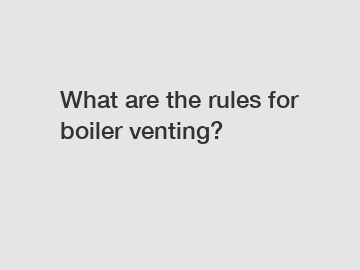What are the rules for boiler venting?
Welcome to our comprehensive guide on the rules for boiler venting. Reliable and efficient venting is crucial for the safe operation of boilers and the overall well-being of your home or business. In this article, we will explore key regulations surrounding boiler venting, helping you ensure compliance, safety, and optimal performance. Let's dive in!
The Importance of Proper Boiler Venting:
Boiler venting is committed to maintaining indoor air quality, preventing hazards such as carbon monoxide (CO) poisoning and ensuring the removal of harmful combustion byproducts. By complying with the following rules, you can safeguard your property, reduce energy consumption, and extend the lifespan of your boiler system.

Understanding Venting Categories:
Boiler venting is categorized into two distinct types: natural draft and mechanical draft. Natural draft venting utilizes natural atmospheric pressure for the removal of exhaust gases, whereas mechanical draft venting employs fans to assist in the process. Let's examine the rules specific to each type.
Natural Draft Venting Rules:
1. Vent Sizing: The vent size should accommodate the boiler's heat output, including factors such as fuel type, altitude, and length of vent piping. Improper vent sizing can lead to backdrafting and poor combustion, jeopardizing the safety of occupants.
2. Vent Material: Venting materials must be appropriate for the flue gas temperature. Common options include galvanized steel, stainless steel, or approved plastic materials. The material should also be resistant to corrosion and deterioration caused by exhaust gases.
3. Vent Pitch: Natural draft vent pipes should be installed with an upward pitch of 1/4 inch per foot. This ensures that condensation flows back to the boiler rather than pooling within the vent, preventing damage and maintaining proper performance.
Mechanical Draft Venting Rules:
1. Power Venting: Mechanical draft venting relies on power-driven fans to remove combustion gases. These fans should be interlocked with the burner control system, ensuring proper ventilation before burner ignition and shutoff. This prevents dangerous situations like accumulating flammable gases.
2. Venting System Construction: Mechanical draft systems should consist of approved vents that are properly assembled, sealed, and supported, allowing for efficient gas expulsion. Ensuring that fittings, joints, and seals are secure eliminates potential leakage points and ensures optimal system performance.
3. Vent Termination: Mechanical draft vents should terminate above the roofline, ensuring appropriate dilution of exhaust gases into the atmosphere. Termination points should also consider nearby windows, obstructions, and air intakes to avoid recirculation of harmful gases into living or working spaces.
Adhering to Common Regulations:
1. Codes and Standards: Strict adherence to local, regional, and national codes and standards is paramount. Familiarize yourself with organizations such as the National Fire Protection Association (NFPA) and American Society of Heating, Refrigerating and Air-Conditioning Engineers (ASHRAE) that provide industry guidelines.
2. Regular Maintenance: Boiler systems should undergo periodic inspections and maintenance by qualified technicians. Professional oversight ensures the detection of venting issues, such as blockages or deterioration, which can impede performance or pose safety risks.
3. Regular Monitoring: Utilize appropriate sensors and alarms to detect and prevent issues like backdrafting, excessive CO levels, or uncontrolled combustion. Early detection systems add an extra layer of safety and help in preemptive repair measures.
Conclusion:
Understanding and complying with the rules for boiler venting are crucial steps in maintaining a safe and efficient heating system. Regardless of whether you opt for natural or mechanical draft venting, a thorough understanding of vent sizing, appropriate materials, system construction, and regulations is essential.
Remember, always consult a professional HVAC technician or contractor for accurate assessment, installation, and maintenance of your boiler venting system. Prioritizing the safety and well-being of occupants should never be compromised when it comes to HVAC operations.
By investing time, effort, and resources into proper boiler venting, you can secure uninterrupted heating, minimize energy consumption, and enjoy peace of mind in your residential or commercial space. Stay informed, stay compliant, and keep your boiler venting in tip-top shape!
If you are looking for more details, kindly visit Marine Composite Boiler, Boiler Finned Tubes, Best Waste Heat Boilers.


